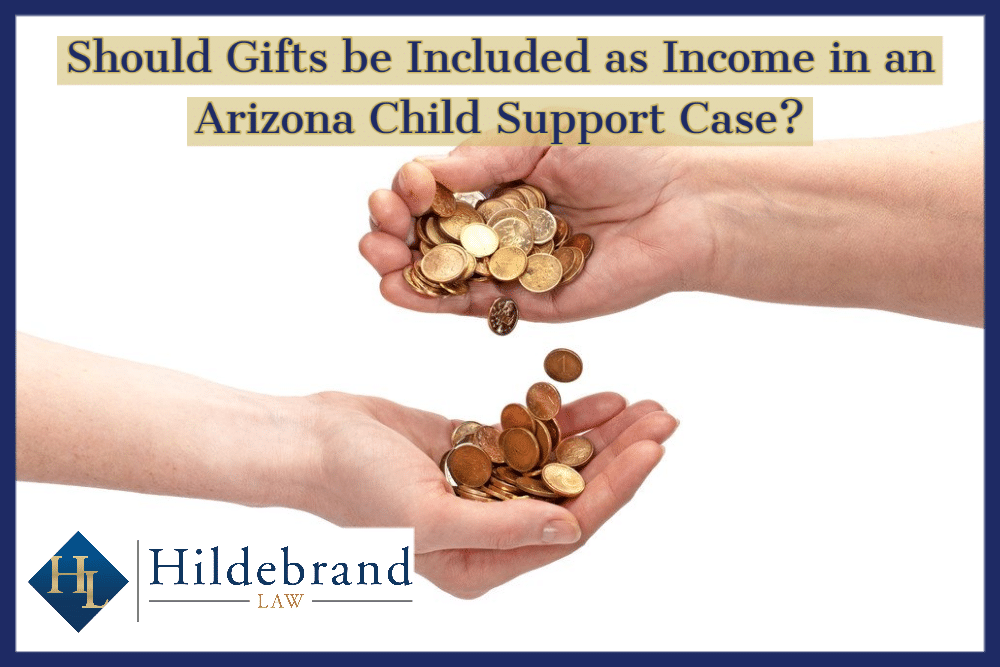Gift Income and Modification of Child Support in AZ | Hildebrand Law, PC

The Arizona Court of Appeals in a memorandum decision in the case of Matthews vs. Robles had to address, among other issues, who has the burden of proving gift income in a modification of child support case in Arizona. The following is the ruling from that Court of Appeals decision.
The Court of Appeals stated Father appeals the superior court’s ruling modifying child support, legal decision-making, and parenting time. The Court of Appeals stated that for reasons that follow, we affirm. Mother and Father have one child together: D.M., born in 2011.
The Court of Appeals stated that in December 2013, the superior court entered judgment (based in part on the parties’ agreement under Rule 69 of the Arizona Rules of Family Law Procedure) establishing paternity, giving the parties joint legal decision-making, declaring Mother the primary residential parent with Father to have parenting time each weekday and alternating weekends, and imposing on Mother a monthly child support obligation of $39.46. Just over one year later, the parties agreed to terminate Mother’s ongoing child support obligation based on Father’s increased income, and the court entered an order to that effect.

The Court of Appeals stated that in August 2016, Father filed a petition to modify legal decision-making, parenting time, and child support. After an evidentiary hearing at which both Father and Mother testified, the court modified their co-parenting arrangement by granting the parties joint legal decision-making, establishing equal parenting time, and imposing on Mother a monthly child support obligation of $47.05. The court denied Father’s subsequent motion to alter or amend the judgment, and Father timely appealed. Father challenges the superior court’s child support calculation and related rulings. The Court of Appeals stated that we review a child support award for an abuse of discretion, accepting the superior court’s factual findings unless clearly erroneous. See Engel v. Landman, 221 Ariz. 504, 510 (App. 2009). The Court of Appeals stated we similarly review the court’s legal decision-making and parenting time decisions for an abuse of discretion. Nold v. Nold, 232 Ariz. 270, 273 (App. 2013).
The Court of Appeals stated Mother did not file an answering brief. Although we could treat her failure to do so as a confession of error, instead we exercise our discretion to address the merits of Father’s claims. See Savord v. Morton, 235 Ariz. 256, 259 (App. 2014). Father first challenges the superior court’s calculation of his gross income for child support purposes. The court considered Father’s acknowledged $16.67 hourly wage, and further attributed an additional $1,037 per month in recurring gifts from his family. See Ariz. Rev. Stat. (“A.R.S.”) § 25-320 app. (“Guidelines”) § 5(A). The court noted that Mother did not provide new evidence of recurring gifts, but rather relied on the 2013 child support order that attributed additional income to Father and the absence of any evidence that the payments had changed since that time.
Should Gifts be Included as Income in an Arizona Child Support Case

The Court of Appeals stated that Father asserts that the court erred by considering the additional gift income because Mother did not present evidence to support it and because the 2013 child support order never specifically referenced recurring gift income. Although the 2013 child support worksheet did not expressly designate a portion of Father’s income as recurring gifts, the record supports an inference that the 2013 calculation was based on $1,037 in gift income in addition to Father’s wages. Father’s affidavit of financial information at that time listed $1,950.40 in monthly wages. Mother argued that Father should be attributed additional income due to recurring monetary gifts from his family, apparently evidenced by Father’s bank statements.
The Court of Appeals stated that the court in fact attributed to Father $2,987.92 per month, approximately $1,037 more than Father’s acknowledged monthly wages. Accordingly, the record supports the inference drawn by the superior court that the 2013 child support calculation attributed to Father $1,037 in recurring gift income. For purposes of the modification, Mother raised the issue of recurring gift income in her pretrial statement, and the court’s ruling reflects that Father failed to provide any controverting evidence or evidence that he no longer received regular monetary gifts from his family.
The Court of Appeals stated Father did not provide a transcript of the evidentiary hearing to complete the record on appeal, so we must presume the missing transcript supports the superior court’s findings and ruling in this regard. See Kohler v. Kohler, 211 Ariz. 106, 108 n.1 (App. 2005); see also ARCAP 11(c)(1)(A)–(B) (noting appellant’s duty to provide any transcripts “necessary for proper consideration of the issues on appeal,” particularly to substantiate an argument that the ruling is not supported by the evidence presented). In light of the reasonable inference that Father received recurring gift income at the time of the 2013 child support calculation, and lacking any evidence that Father no longer received regular monetary gifts, the superior court did not abuse its discretion by attributing to Father an additional $1,037 per month in gift income.
The Court Stated Father next argues that the court erred by crediting Mother for the cost of health insurance covering her as well as the child. The court considered $140 as the cost paid by Mother to provide health, dental, and vision insurance for the child. See Guidelines § 9(A).

The Court Stated that although, as Father points out, Mother’s affidavit of financial information did not separate the cost to ensure her from the cost to ensure the child, Mother had previously asserted that the cost to ensure the child was $140. Moreover, Mother testified at the evidentiary hearing, and as Father failed to provide the transcript, we must presume the evidence presented supports the court’s finding as to the cost of insurance. See Kohler, 211 Ariz. at 108 n.1. Father argues the superior court erred by failing to credit him for the cost of childcare even though he pays the full cost of the child’s daycare. But the inclusion of childcare expenses is not mandatory; instead, the court has discretion whether to add to the basic support obligation childcare costs “that would be appropriate to the parents’ financial abilities.” Guidelines § 9(B)(1).
The Court of Appeals stated here, the parties disputed the appropriate provider of, cost of, and payment for the child’s daycare—all of which would necessarily change in a matter of months when the child started school. And without a transcript of the evidentiary hearing to review the evidence presented as to the actual cost (and reasonableness of the cost) of daycare, we must presume the record supports the superior court’s determination. See Kohler, 211 Ariz. at 108 n.1. D.
The Court of Appeals then stated Father next argues the superior court erred by changing the years for which each parent could claim tax exemptions for the child, asserting that the parties’ 2013 Rule 69 agreement set the schedule (Mother in even years, Father in odd) and that neither side sought to change it. But Father’s petition to modify requested the right to claim the child every year, and Mother sought a pro rata division based on relative income (Mother two years, Father every third). See Guidelines § 27 (allowing allocation of tax exemptions by agreement or by the proportionate share of combined adjusted gross income). Although Father’s pretrial statement asserted the 2013 Rule 69 agreement as a stipulation to “alternate years for the tax deduction,” Mother’s pretrial statement reflected no such agreement.
The Court of Appeals stated In any event, the court’s resolution retained the previously agreed 50–50 split and simply traded the specific years (Father in even years, Mother in odd). As each parent had received the benefit of the tax exemption under the 2013 judgment twice before the modified support order went into effect, the modification did not give Mother any greater benefit than Father. Father argues that the superior court erred by ordering that the modified support order take effect the first of the month following entry of the order and that the court should instead have retroactively applied the modified support amount from when Mother stopped paying for childcare or when he filed his petition to modify.
The Court of Appeals stated Father relies on A.R.S. § 25-320(B), which provides for retroactive child support from the date of the petition “[i]f child support has not been ordered by a child support order.” But here Father sought modification after an initial child support order in 2013 (and a modification in 2015), so § 25-320 is inapposite. Instead, the proceeding was governed by the modification provisions of A.R.S. § 25-327. Under § 25-327(A), child support modifications generally take effect on the first of the month following notice of the petition to modify, but the court has the discretion to order that the change becomes effective on a later date “for good cause shown.”
The Court of Appeals stated the superior court here found good cause to begin payments the month after entry of the modification order to coincide with the beginning of the new equal parenting time plan, which was itself one variable on which the child support calculation was based. Because the circumstances underlying the new child support calculation did not take effect until after entry of the modification order, the court did not abuse its discretion by finding good cause to begin the new child support obligation at the same time. II. Parenting Time. Father argues that the court erred by failing to “remove[]” the designation of Mother as the primary residential parent in light of the new equal parenting time plan. But the modification order does not include any such designation; instead, it properly states that the parents “share equal parenting time” on a 5/2/2/5 schedule.
The Court of Appeals stated that accordingly, Father has not shown error in this regard. III. Motion to Alter or Amend the Judgment. Father contends that, for the same reasons argued on appeal, the superior court should have granted his motion to alter or amend the judgment.
Court’s Ruling on Adding Gifts to a Parent’s Income to Calculate Child Support in Arizona

The Court stated that given our resolution of the other arguments presented, Father has not shown that the court erred in denying his post-trial motion. Father seeks an award of his attorney’s fees and costs on appeal under A.R.S. §§ 12-341 and 25-324. Because Father’s appeal was not successful and having considered the relevant criteria under § 25-324, we deny his request for fees and costs. The superior court’s modification ruling is affirmed.
If you have questions about the burden of proving gift income in a modification of child support in an Arizona divorce case, you should seriously consider contacting the attorneys at Hildebrand Law, PC. Our Arizona child support and family law attorneys have decades of combined experience successfully representing clients in child support and family law cases.
Our family law firm has earned numerous awards such as US News and World Reports Best Arizona Family Law Firm, US News and World Report Best Divorce Attorneys, “Best of the Valley” by Arizona Foothills readers, and “Best Arizona Divorce Law Firms” by North Scottsdale Magazine.
Call us today at (480)305-8300 or reach out to us through our appointment scheduling form to schedule your personalized consultation and turn your Arizona child support or family law case around today.
Contact Form
Other Articles About Child Support in Arizona
- ARIZONA CHILD SUPPORT LAWS
- ARIZONA UNIFORM INTERSTATE FAMILY SUPPORT ACT (UIFSA) STATUTES
- ATTRIBUTING INCOME FOR CHILD SUPPORT IN ARIZONA
- DIVIDING UNCOVERED MEDICAL EXPENSES IN AN ARIZONA CHILD SUPPORT CASE
- THE RELATIONSHIP BETWEEN CHILD SUPPORT AND DEBTS IN ARIZONA
- THE DEFINITIVE GUIDE TO CHILD SUPPORT IN ARIZONA
- DUE PROCESS REQUIRES NOTICE OF A CHILD SUPPORT MODIFICATION
- CHILD SUPPORT DEVIATION IN ARIZONA
- IS AN INCREASE IN INCOME CAUSE TO MODIFY CHILD SUPPORT IN ARIZONA
- CHILD SUPPORT AND ASSETS IN ARIZONA
- EFFECT OF EMPLOYMENT BENEFITS ON CHILD SUPPORT IN ARIZONA
- EFFECT OF STOCK OPTIONS ON CHILD SUPPORT IN ARIZONA
- MODIFYING CHILD SUPPORT FROM ANOTHER STATE IN ARIZONA
- CHILD SUPPORT MUST BE MODIFIED WHENEVER CHILD CUSTODY ORDERS CHANGE IN ARIZONA
- REGISTERING A CHILD SUPPORT ORDER IN ARIZONA
- BURDEN OF PROOF FOR A DEVIATION IN CHILD SUPPORT IN ARIZONA
- REIMBURSEMENT FOR OVERPAID CHILD SUPPORT IN ARIZONA
- GIFTS AND FREE RENT MAY BE INCOME FOR CHILD SUPPORT PURPOSES
- COURT DISCRETION TO ADD RECURRING GIFTS AS INCOME FOR CHILD SUPPORT
- CHILD SUPPORT AND THE NARCISSIST PARENT
- INCLUDING INCOME FROM A SECOND JOB IN ARIZONA CHILD SUPPORT CALCULATIONS
- STANDARD OF PROOF TO ESTABLISH A WAIVER OF PAST CHILD SUPPORT IN ARIZONA
- CHILD SUPPORT CANNOT BE A PERCENTAGE OF A PARENT’S INCOME IN ARIZONA
- WHAT IS A WAGE ASSIGNMENT IN ARIZONA
- THE AGE WHEN CHILD SUPPORT ENDS IN ARIZONA
- SSDI PAYMENTS OFFSET MEDICAL EXPENSES FOR A CHILD IN ARIZONA
- MODIFYING CHILD SUPPORT WHEN NEITHER PARENT LIVES IN ARIZONA
- HOW TO MODIFY OR ENFORCE A CHILD SUPPORT ORDER ISSUED IN ANOTHER STATE
- HOW TO MAKE ARIZONA CHILD SUPPORT PAYMENTS
- HOW IS INCOME CALCULATED FOR CHILD SUPPORT IN ARIZONA
- HOW TO ENFORCE A CHILD SUPPORT ORDER IN ARIZONA
- WHAT IS CONSIDERED GROSS INCOME FOR ARIZONA CHILD SUPPORT
- CALCULATING A PARENT’S INCOME FOR CHILD SUPPORT IN ARIZONA
- ERRORS IN REGISTERING A CHILD SUPPORT ORDER FROM ANOTHER STATE IN ARIZONA
- DOMESTICATING A CHILD SUPPORT ORDER IN ARIZONA
- CHILD SUPPORT AND AN UNEMPLOYED PARENT IN ARIZONA
- WHAT DOCTORS SHOULD KNOW ABOUT CHILD SUPPORT IN ARIZONA
- CAN A NON-CUSTODIAL PARENT RECEIVE CHILDREN’S SOCIAL SECURITY BENEFITS IN ARIZONA
- START DATE FOR TEMPORARY SUPPORT IN ARIZONA
- EFFECT OF DENIAL OF VISITATION ON CHILD SUPPORT PAYMENTS IN ARIZONA
- ARIZONA CHILD SUPPORT FREQUENTLY ASKED QUESTIONS
- EFFECT OF ERRORS IN REGISTERING A CHILD SUPPORT ORDER FROM ANOTHER STATE IN ARIZONA
- WHEN YOU CAN MODIFY CHILD SUPPORT IN ARIZONA
- WAIVER OF PAST CHILD SUPPORT BY AGREEMENT IN ARIZONA
- UPWARD DEVIATION IN CHILD SUPPORT IN ARIZONA
- MODIFYING A CHILD SUPPORT ORDER FROM ANOTHER COUNTRY
- OBJECTION TO CHILD SUPPORT ARREARS IN UIFSA DOMESTICATION IN ARIZONA
- CAN A SPOUSE’S INCOME BE CONSIDERED FOR CHILD SUPPORT IN ARIZONA
- LEGAL METHODS OF COLLECTING CHILD SUPPORT PAYMENTS IN ARIZONA
- ENFORCEMENT OF A FOREIGN COUNTRY CHILD SUPPORT ORDER IN ARIZONA
- DRIVERS LICENSE RESTRICTIONS FOR UNPAID CHILD SUPPORT IN ARIZONA
- CAN A LOAN BE INCLUDED AS INCOME FOR CHILD SUPPORT IN ARIZONA
- OVERPAYMENT OF CHILD SUPPORT IN ARIZONA
- PAST DUE SUPPORT PAYMENTS APPLY FIRST TO CHILD SUPPORT BEFORE ALIMONY
- CALCULATING CHILD SUPPORT WITH SPLIT CUSTODY OF CHILDREN IN ARIZONA
- EFFECT OF DELAY IN COLLECTING CHILD SUPPORT ARREARAGES IN ARIZONA
- RECOVERING CHILD SUPPORT NOT ORDERED IN A DIVORCE DECREE IN ARIZONA
- LEGAL OPTIONS FOR COLLECTING CHILD SUPPORT PAYMENTS IN ARIZONA
- ARIZONA COURT’S AUTHORITY TO HEAR CHILD SUPPORT ENFORCEMENT ACTIONS
- IMPACT OF WITHHOLDING A CHILD ON CHILD SUPPORT IN ARIZONA
- SISTER STATE’S RIGHT TO MODIFY ARIZONA CHILD SUPPORT RULING
- IS A CHILD SUPPORT ORDER VOID IF IT DOES NOT MENTION ARREARS IN ARIZONA
- CHILD SUPPORT OBLIGATIONS OF A MINOR IN ARIZONA
- TIME LIMIT TO COLLECT CHILD SUPPORT ARREARAGES IN ARIZONA
- RETROACTIVE MODIFICATION OF A CHILD SUPPORT ORDER IN ARIZONA
- CONTEMPT OF COURT FOR UNPAID CHILD SUPPORT ARREARAGES IN ARIZONA
- SUPPORT FOR DISABLED ADULT CHILDREN IN ARIZONA
- CALCULATING INCOME FOR CHILD SUPPORT IN ARIZONA
- THREE YEAR LIMITATION FOR COLLECTING CHILD SUPPORT ARREARAGES
- DISMISSING MODIFICATION OF CHILD SUPPORT FOR NOT DISCLOSING FINANCIAL DOCUMENTS
- ARIZONA CHILD SUPPORT MODIFICATIONS MUST INCLUDE ANY CHANGES IN PARENTING TIME
- EQUITABLE DEFENSES TO FAMILY SUPPORT IN ARIZONA
- AFFIDAVIT OF CHILD SUPPORT ARREARS FROM ANOTHER STATE IN ARIZONA
- PERSONAL JURISDICTION AND CHILD SUPPORT ARREARAGES IN ARIZONA
- PERSONAL JURISDICTION OVER A NON-RESIDENT IN AN ARIZONA CHILD SUPPORT CASE
- ARIZONA CRIMINAL LAW FOR NON-PAYMENT OF CHILD SUPPORT IS CONSTITUTIONAL
- BURDEN OF PROOF IN A MODIFICATION OF CHILD SUPPORT CASE IN ARIZONA
- FULL FAITH AND CREDIT CLAUSE REQUIRES PERSONAL JURISDICTION TO ENFORCE SUPPORT ORDERS
- CHILD SUPPORT IN A BANK ACCOUNT IS EXEMPT FROM EXECUTION BY CREDITORS
- NON-PARENT LAWSUIT FOR REIMBURSEMENT OF CHILD SUPPORT IN ARIZONA
